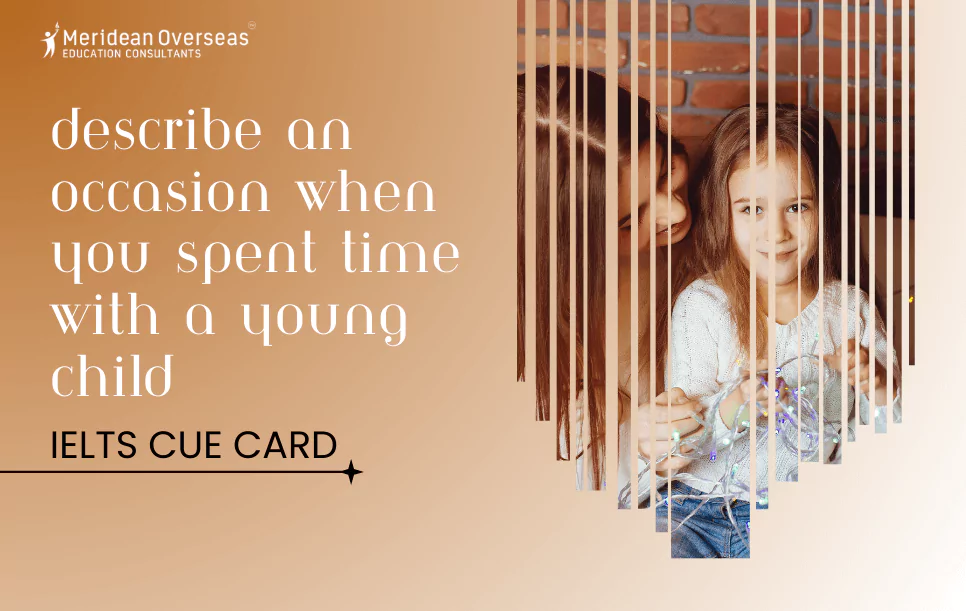
Announcements

Announcements

Meridean Overseas
Updated On 22 April 2024 & Read Time 10 minutes
5.2k
The topics of the IELTS speaking exam cue cards are usually descriptive; that is, you will be asked to describe a particular place, thing, person, or object and your relationship to it. The examination will be given over a video interface in the customised online scenario, and the candidate will receive a score based on their performance from the competent professional examiner. During the cue card, the candidate will speak for one to two minutes; one minute is reserved for preparation.
The topic "Describe an occasion when you spent time with a young child" is one of the most frequently requested subjects in cue cards. So, let's discuss a few examples of responses to this topic in this blog.
Table of Contents
I have always loved being around kids. Interacting and playing with them is absolutely fun. Here, I would like to describe one such kid whom I love a lot.

Recently, I spent a beautiful Sunday with my four-year-old niece, Mira. Mira is usually full of activity, so there's never a dull moment when she's around! I decided to take Mira to the nearby park on a Sunday morning so she could play on the playground and enjoy the lovely weather. It was a wonderful Sunday morning.
Mira is my real sister's younger daughter. My family members often say that Mira’s habits and my habits resemble a lot.
Mira is such a cheerful kid; she keeps people around her busy and engages them in some fun activities with her. It’s always relaxing to play and spend time with her.
She was having the best time scampering around and enjoying on the swings and slides, but the best part was when she insisted I play with her. We ultimately had an amazing time chasing each other around the playground until we were both exhausted. I could almost feel how much fun we were having. It was so nice to see her smiling so much!
We then quickly visited a neighbouring ice cream shop to grab some delicious goodies. It felt like I was reliving my childhood, and Mira was enjoying every second of it. After discussing what we could do next, we ultimately decided to feed some stray dogs and cats, as Mira loves animals a lot. I was thrilled to see Mira get so delighted as the dogs approached us.
Overall, the day was ideal, and spending time with Mira was genuinely memorable. I was very happy to spend time with her because she is so innocent, pure and fun.
Also, read: Describe an occasion when you got incorrect information - IELTS Cue Card
Spending quality time with young children can help us learn a lot from them and also help us decompress. I'll talk about that instance where I spent time with the small youngster here.
That occurred when I was employed in Pune. Since I had no relatives in Pune, I had to live on rent. I was staying in a two-storey building, with the landlady living on the ground floor and me living on the first floor with one of my colleagues. My landlady had a nine-month-old daughter, Aarvi, with whom I used to spend most of my evenings after work.
I really liked to spend time with Aarvi, as playing with her used to boost my mood instantly. Her cute smiles and naughty habits have always made me laugh and she gives off a very positive vibe.
Honestly, after a very hectic schedule at the office, it feels very therapeutic to play with her. Since she is very small and cannot understand and play games, I simply try to interact with her and make her smile.
Regardless of the circumstances in your household or life, spending one-on-one time with children is a simple way to feel less stressed, be happier and more connected.
Also, read: Describe a popular/famous person in your country - IELTS Cue Card
Embark and excel in your study abroad journey with our expert team!

Question: While travelling with children, which of the parents takes more care of the children?
Answer: Parental caregiving while travelling can take several forms according to each family's unique circumstances and dynamics. On the other hand, it's typical for both parents to split up the duty of looking after their kids while they travel. Together, the two parents should take proactive steps to guarantee their kids' comfort, safety, and well-being during the trip.
Question: Do you think there are too many rules for young children to follow, whether at school or at home?
Answer: Yes, they need to abide by several rules both at home and at school. Regulations are essential to their general growth. For instance, they learn the value of time and become punctual when they attend or go to school at a specific hour. That being said, there needs to be a balance. There should be a reasonable amount of regulations for young children because this could limit their horizons and hinder their inventiveness.
Question: Do you think children should follow all the rules?
Answer: It is essential that kids follow the rules. They should never mindlessly accept rules; instead, they should always ask their parents or teachers to enlighten them by providing them with the background knowledge or rationale for the rules. Regulations help children develop a variety of qualities, including discipline and respect for others, and help them become responsible members of society. By doing this, they would gain knowledge of the significance of each regulation.
Question: How do parents teach children to respect people?
Answer: Youngsters' social growth depends on their learning to respect others. Parents can set an example for their children by acting with kindness and respect in their own relationships. Additionally, they can have real, developmentally appropriate discussions with their kids on the value of showing empathy, respect, and understanding to others. Respect for others can also be fostered in kids by teaching them to be polite, respect variety, and listen to and consider other people's viewpoints.
Question: Do you think it’s necessary for parents to make decisions for their children?
Answer: Without a question, parents are crucial to their children's upbringing, development, and safety, especially when those needs are at stake. But as time goes on, it becomes crucial to get kids' feedback and engage them in constructive dialogue. They can appreciate their independence and hone their critical thinking abilities, thanks to the freedom of expression.
Question: Do outdoor activities help children?
Answer: Engaging in outdoor activities benefits kids in a variety of ways. First, they acquire teamwork skills when they play team games or activities. Second, outdoor activities help them build their cognitive abilities and mental and physical fitness. Additionally, outdoor activities allow kids to socialise, which enhances their social skills. Moreover, kids benefit from outdoor activities by taking a much-needed break and feeling less stressed.
Question: Do you think it’s good for parents to help children choose friends?
Answer: I believe that children should select their friends. Their social abilities are improved through the process of establishing friendships. Nonetheless, parents ought to occasionally try to engage with their kids' friends to learn more about their traits and behaviour. They could use this information to determine whether or not their kids are in safe companionship.
Question: What is the difference between the outdoor activities children play now and before?
Answer: The first distinction is that since children spend so much time on phones and computers these days, they don't engage in outdoor activities much. Second, children used to have much more flexibility when swimming in lakes and exploring forests and caves. These days, kids mostly play mainstream sports like cricket, football, and other games. This could be because there were fewer crimes and less developed sports facilities in the past, which made parents feel comfortable letting their kids play unattended.
Question: Where do children usually play?
Answer: Sadly, a lot of children these days only play at home. They might play alone on a downloaded app, or they could play online with other children who live far away. They typically play these activities in their rooms, but occasionally, you can catch them in the living room as well. However, children who enjoy physical activities may be found in the park if one is close by. Additionally, active kids may play on a football field, basketball court, or gym close to their house or school.
Question: Which side, the father or the mother, invests more experience in caring for the child? Why? How can we change this?
Answer: Mothers typically devote more time to raising their children, in my opinion. Women used to take care of the children because men used to work, and women were usually homemakers in the past. Even though the majority of women presently work, they are still seen as having greater responsibility for raising children. Secondly, biological factors are to blame. Put another way, women experience a level of love and concern for their offspring that males do not share after giving birth. Although I don't think we can stop it entirely, it is gradually happening on its own.
Also, read: Describe an adventure you would like to go on - IELTS cue card
In summary, the IELTS speaking test may cover a wide variety of cue card themes. It's critical to act quickly when taking notes and offering suggestions for what to say. Speaking with more confidence will sound more effortless and natural.
We hope you learned how to answer the “Describe an occasion when you spent time with a young child” type of questions in your IELTS speaking test. If you want to get further details or would like to prepare for IELTS, you can contact our expert counsellors at Meridean Overseas Education Consultants (MOEC). You can also take free online counselling through our website. Our expert counsellors will provide you with the best support and guidance you need for admission and visa. In addition, they will help you shortlist the universities according to your profile. For more information or any queries, contact application02@meridean.org or 1800-1230-00011.
Boost your IELTS score with effective practice using these sample papers.
Get Your Free Guide

Contact MOEC Experts for Study Abroad Guidance!
By using our site, you agree to our use of cookies.

Hurry up before admissions close.

Contact MOEC Experts for Study Abroad Guidance!
